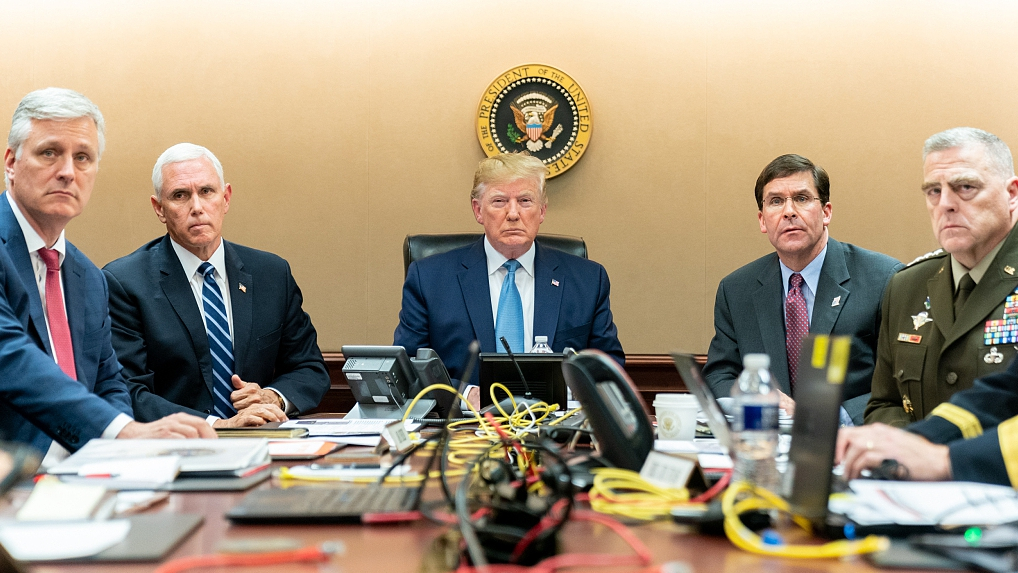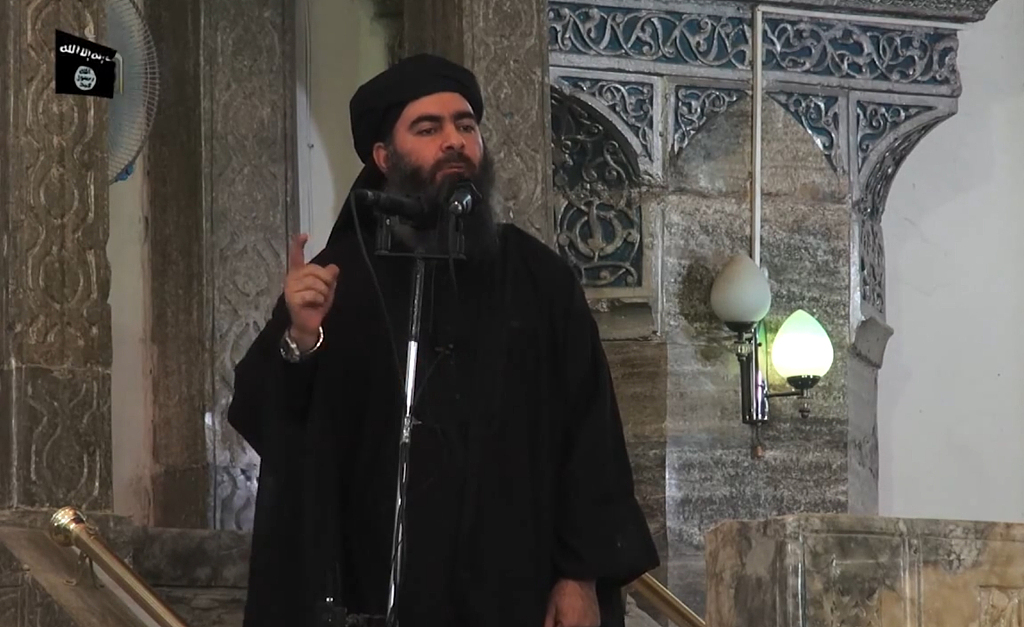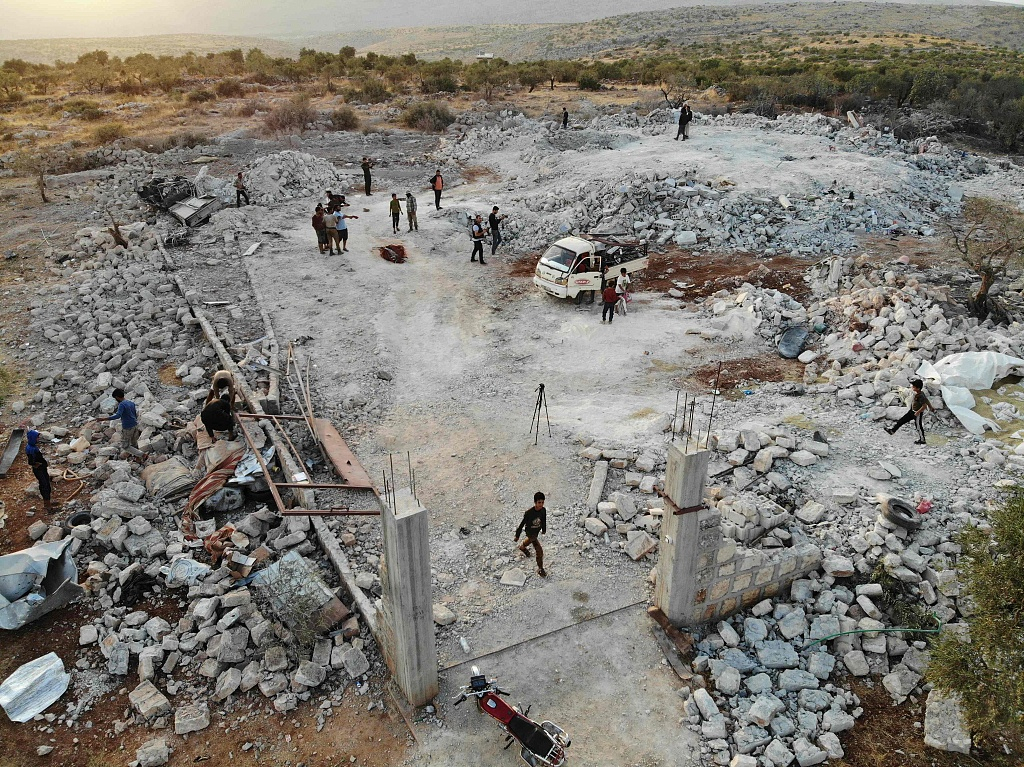
U.S. President Donald Trump (C), joined by Vice President Mike Pence (L2) and others watch U.S. special forces' operation targeting ISIL leader Abu Bakr al-Baghdadi in Washington, D.C., U.S., October 26, 2019. /VCG Photo
U.S. President Donald Trump (C), joined by Vice President Mike Pence (L2) and others watch U.S. special forces' operation targeting ISIL leader Abu Bakr al-Baghdadi in Washington, D.C., U.S., October 26, 2019. /VCG Photo
The United States wants to bolster a coalition fighting ISIL in northeastern Syria, a senior State Department official said on Monday, after the leader of the jihadi movement, Abu Bakr al-Baghdadi, was killed in a weekend operation. World leaders welcomed his death, but they and security experts warned that the group remained a security threat in Syria and beyond.
The official said that President Donald Trump, by announcing the withdrawal of U.S. forces from northern Syria on October 6, did not suggest that Washington was abandoning the fight against ISIL.
"There was never an idea that we would abandon the mission of going after ISIL... This is a major effort that is continuing," the official told reporters.
Trump has softened his pullout plans for Syria after a backlash from Congress, including fellow Republicans, who say he enabled a Turkish incursion on October 9 against Kurdish forces in Syria who had been America's top allies in the battle against ISIL since 2014.
U.S. special forces carried out the Syrian operation in which Baghdadi killed himself and three of his children by detonating a suicide vest when he was chased down a dead-end subterranean tunnel under a hideaway in northwest Syria.
His body has been buried at sea by the U.S. military after he killed himself, paralleling the 2011 sea burial of Al-Qaeda leader Osama bin Laden after he was killed in a U.S. special forces raid in Pakistan.
Trump said on Monday he may declassify and release part of the video taken on Saturday of the raid. The video is believed to include aerial footage and possibly footage from cameras mounted on the soldiers who stormed Baghdadi's compound.
Killing the leader may not stop ISIL

A file photo of ISIL leader, Abu Bakr al-Baghdadi who was making his first public appearance in Mosul, July 5, 2014. /VCG Photo
A file photo of ISIL leader, Abu Bakr al-Baghdadi who was making his first public appearance in Mosul, July 5, 2014. /VCG Photo
The killing of Abu Bakr al-Baghdadi is of considerable importance, experts believe, but the underlying reasons for his jihadist group's existence remain and attacks in the Middle East and beyond are not likely to stop.
"This is a blow to the organization considering al-Baghdadi's stature as a leader. But this is just a momentary setback considering the depth and reach of the organization worldwide,"Delfin Lorenzana, defense secretary of the Philippines said. "Somebody will take his place."
ISIL has no declared successor as leader. But the group has in the past proved resilient, continuing to mount or inspire attacks in the region and beyond despite losing most of its territory in recent years. Even if it does face difficulties in the leadership transition, the underlying ideology and the sectarian hatred it promoted remains attractive to many.
ISIL's effectiveness arises from its members' loyalty to its ultra-fanatical Islamist ideology, and this may not be much affected by the killing of its leader, said Fadhil Abu Ragheef, an Iraqi political analyst and security expert.

An aerial view shows the site where the ISIL leader hid was hit by U.S. special forces on the outskirts of Barisha, Idlib, Syria, October 27, 2019. /VCG Photo
An aerial view shows the site where the ISIL leader hid was hit by U.S. special forces on the outskirts of Barisha, Idlib, Syria, October 27, 2019. /VCG Photo
He said ISIL's nine-man Shura Council, or leadership group, was expected to meet and appoint a leader from among five candidates.
Among the front runners are Abu Abdullah al-Jizrawi, a Saudi, and Abdullah Qaradash, an Iraqi and one of Baghdadi's right-hand men, also a former army officer under Saddam Hussein. Also mentioned is Abu Othman al-Tunisi, a Tunisian.
"The new leader will start working to pull together the group's power by relying on new recruits and fighters who fled the prisons in Syria. He is expected to launch a series of retaliatory attacks for the killing of Baghdadi," said Abu Ragheef.
However, some experts expressed optimism. A security source with knowledge of militant groups in Iraq said the killing of Baghdadi would splinter the group's command structure because of differences between senior figures and lack of confidence among group members who were forced to go underground when the caliphate collapsed.
"We are aware that killing Baghdadi will not lead to the disappearance of Islamic State (ISIL) because eventually they will pick someone for the job," the source told Reuters. "But at same time whoever follows Baghdadi will not be in a position to keep the group united."
(With input from Reuters)